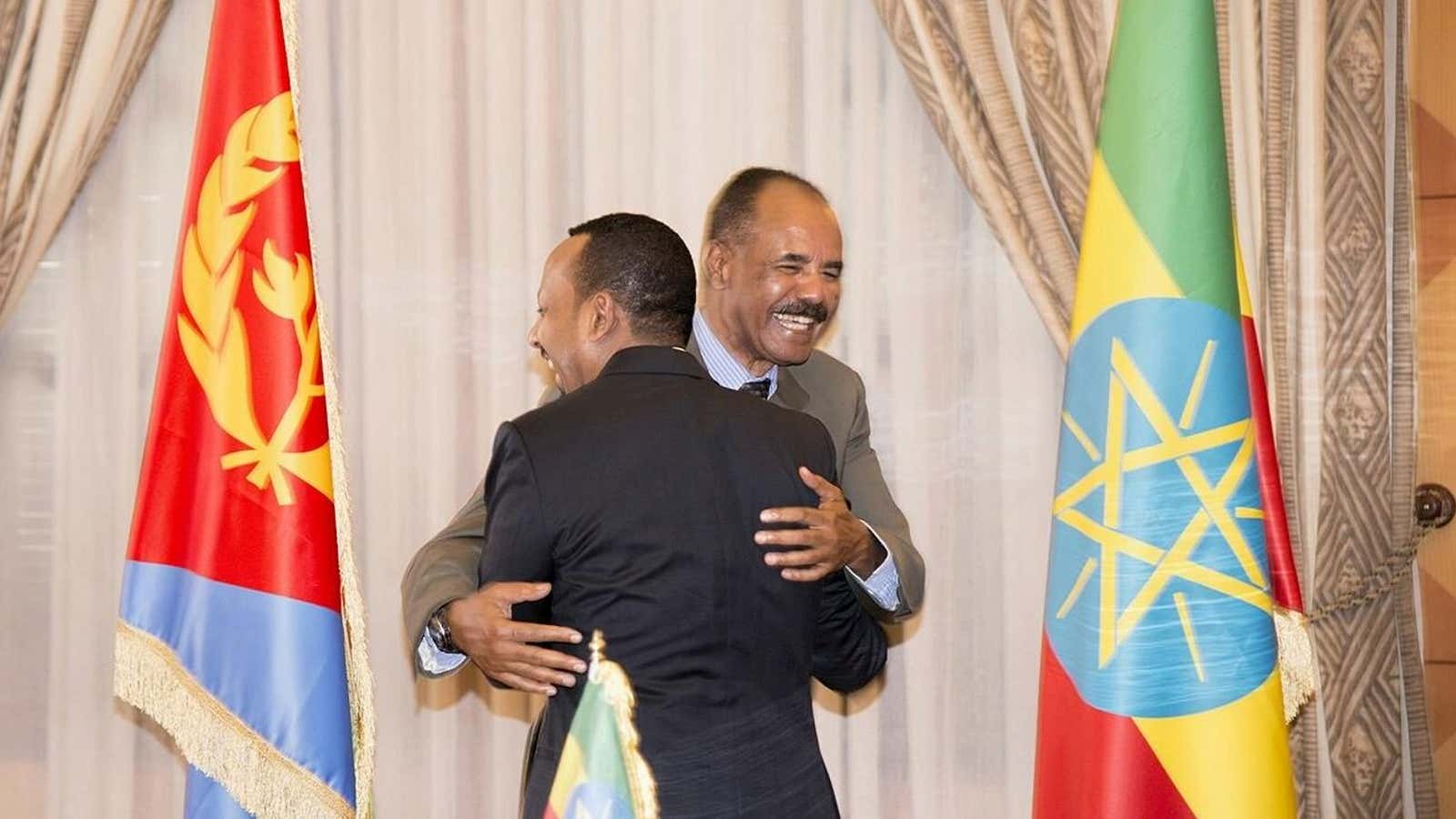It was the dread of serving indefinitely in the national service that strengthened Teclit Kesete’s resolve to leave Eritrea. As a student of journalism, it was also the realization that he wouldn’t be able to adequately pursue a bright career in the world’s most censored nation. And if all else went well, it was the fear of arbitrary arrest and detention like some of his friends and family that haunted him the most.
In March 2012, aged 21, Teclit made the decision to begin the long and treacherous walk to Ethiopia, risking not just arrest but being shot on sight for daring to flee.
Eritrea is a small country with almost six million people that gained independence a quarter of a century ago. Yet prolonged conflict with arch-rival Ethiopia, chronic drought, a mandatory military conscription program likened to slavery, and its authoritarian politics as a one-party state has made it one of the most secretive and isolated nations in the world. To avoid these harsh conditions, young people— over 486,000 of them as of 2017, according to the United Nations— leave in droves, running the gauntlet of smugglers and treacherous waters across the Sahara and the Mediterranean to Europe.
After staying in a camp in Ethiopia, Teclit left for Sudan, then Egypt, and continued the trek through the Sinai desert. Many of the Eritreans he journeyed with died from exhaustion there, others from lack of food and water. With a bit of luck, and holding out for the dream of a better future, Teclit says he kept going until he reached Israel.
“I don’t have words to describe how hard it was,” he said on a recent evening on the phone from Tel Aviv. “I always cried on my way to Israel.”
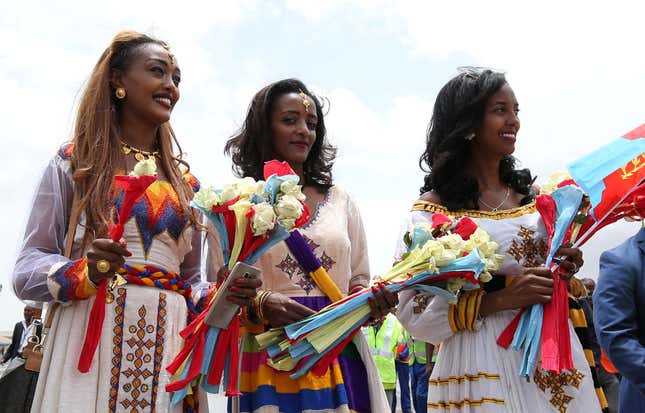
For decades, Eritrea’s ruling People’s Front for Democracy and Justice party justified its domestic repressive policies by pointing to its southern neighbor, Ethiopia. The two nations separated amicably in 1993, but a bitter rivalry over regional dominance helped catalyze a brutal conflict over the town of Badme in 1998, leading to the death of over 70,000 people. After a UN boundary commission awarded the town to Eritrea, Addis Ababa refused to accept, leading to deepening militarization and years of no-war, no-peace stalemate.
Enter Abiy Ahmed, Ethiopia’s youthful prime minister. Two months into office, the 41-year-old reformist announced he would cede the disputed town to Eritrea, effectively ending the two nations’ costly enmity. In turn, president Isaias Afwerki, who once said “an angel or someone like Christ” could only bring about reconciliation, welcomed Abiy in Asmara in a summit that was defined by warm hugs and laughter.
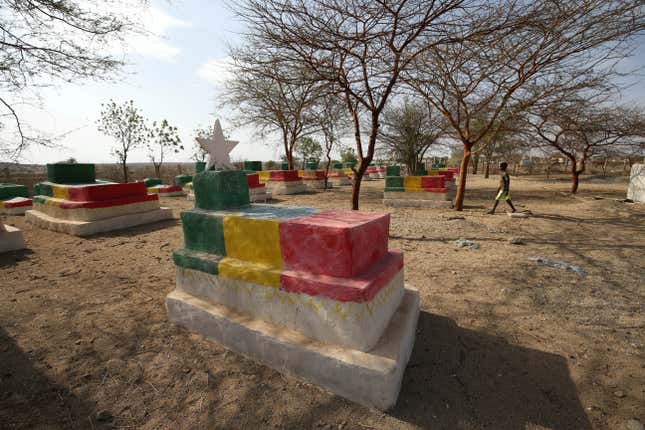
For many Eritreans watching Afwerki, the 72-year-old mustached liberation-fighter-turned-strongman appeared out of character. He called Abiy “our leader” and accorded him all “power” in front of a cheering crowd. The newfound congeniality between the foes was followed by the resumption of trade and flights and the reunification of families—a process that drew admiration from world leaders and regional states.
But while Abiy was radically reshaping Ethiopia’s domestic and foreign affairs, many Eritreans remained skeptical over whether Afwerki was committed as much. In interviews with Quartz, exiled Eritreans said it would take more than just state dinners and concerts to salve their conscience or encourage them to return home.
“Nothing has changed in Eritrea,” Teclit says. “I can’t go back now.”
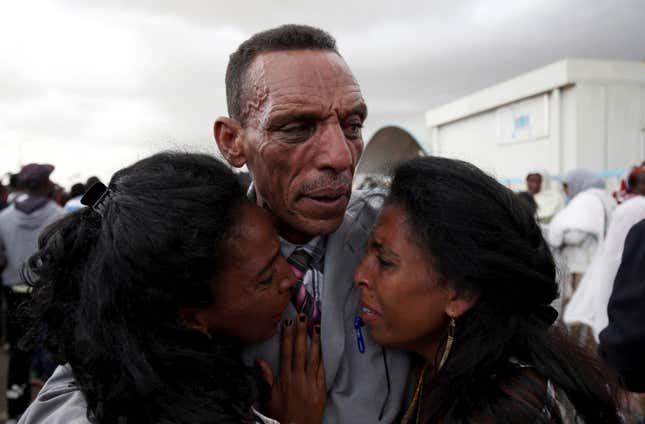
An unlikely nation
Straddling the Red Sea waters along the tip of the Horn of Africa, the story of Eritrea is one defiance and a people remarkably resistant to everything fate has thrown at them. Perhaps nothing exemplifies that history more than the Sandal Monument in Asmara, erected to celebrate the nation’s stout self-standing and its continued resistance against bigger powers.
Starting with Italian fascism and British colonialism, and ending with Ethiopian imperialism, Eritrea has remained a nation punching above its weight. In recent years, besides standing up to Ethiopia, a nation 17 times its size, tensions have mounted between it and Djibouti and Sudan, all while Asmara was accused of propping Islamist rebels in Somalia.
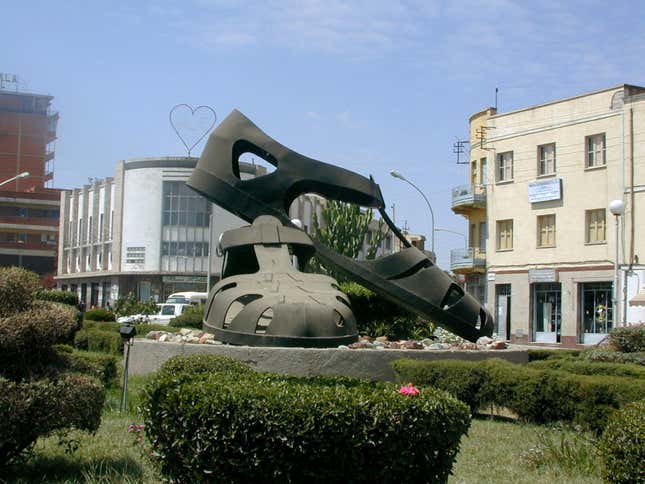
But while Afwerki has squared off with neighboring nations, that has come at a cost for Eritrea’s young. Despaired by the paroxysm of Kafkaesque brutality and uncertainty, many voted with their sandals too.
“I was living in a stifled atmosphere clouded with fear and uncertainty,” Abraham T. Zere, 36, the executive director of the literature organization PEN Eritrea in exile, said in an email from the United States. Instead of remaining in a state of senfelal—limbo in Tigrinya—amid an “open and giant prison,” he says he chose to leave. To reminisce Asmara’s Art Deco movie palaces and streamlined apartments, Abraham now pays close attention to any video footage streaming out of the country.
Trouble has also followed many outside Eritrea. Even though he currently has a working visa that he renews every two months, Teclit spent 19 months in Saharonim prison for African asylum seekers in the Negev desert. Eritreans along with Sudanese migrants have faced maltreatment in Israel, with officials calling them “infiltrators.” After giving numerous ultimatums for them to leave or go to prison, Israeli authorities are now seizing on the news that Eritrea might end its conscription program by vowing to deport them back.
Cautious optimism
Semhar Ghebreslassie, 31, was assigned to the national service as a teacher. Away from her family and frustrated with her job, she left Eritrea and reached Sudan in Dec. 2014. After a smuggler fixed her a visa, she got to France and from there left for Sweden, where she reunited with her three siblings and currently awaits resettlement.
Watching the recent news between Eritrea and Ethiopia unfold, Semhar says the diplomatic bonhomie only favors Ethiopia—and Afwerki. “There was no proper apology to the Eritrean people. There was no platform for peace,” she said on phone from Stockholm. “There was nothing done to prepare for peace inside Eritrea. So it felt blasphemous to Eritrean people.”
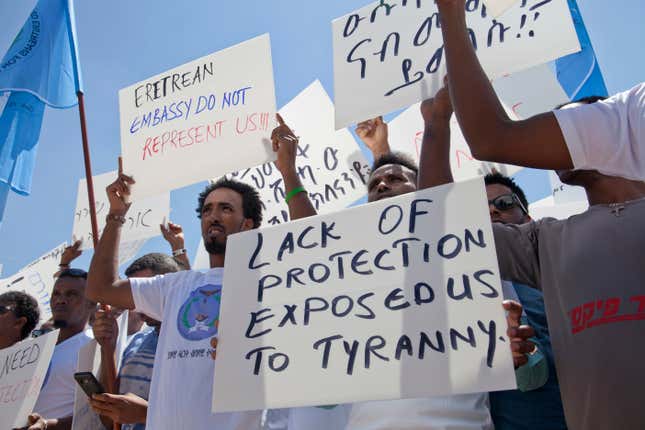
For any progress to happen, she adds prisoners of conscience and journalists have to be released. And like Abraham, she says Afwerki has to vacate office too, much like Abiy’s predecessor Hailemariam Desalegn resigned to pave way for dialogue.
Teclit hopes the rapprochement with Ethiopia will help open things up in his home country. Nowadays, he frequently thinks of his mother who lives in the southern town of Senafe alone, her five children all exiled. “I love my country. The only problem is the government,” he said. “But we now have hope.”
